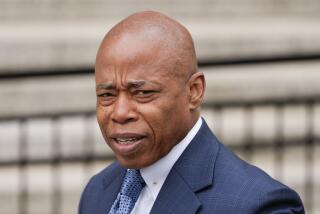John Edwards jury requests more exhibits
- Share via
GREENSBORO, N.C. — A third day of jury deliberations in the campaign finance trial of former presidential candidate John Edwards passed without a verdict Tuesday, with the jurors due back in federal court Wednesday morning.
The jury of eight men and four women requested two more prosecution exhibits, bringing to more than a dozen the number of exhibits sought by jurors since deliberations began Friday.
The documents requested Tuesday were letters to or about Rachel “Bunny” Mellon, now 101, a billionaire heiress and Edwards supporter who gave $725,000 that was used to help hide the candidate’s mistress during his failed campaign for the 2008 Democratic presidential nomination.
Edwards, 58, a former U.S. senator and the 2004 Democratic vice presidential nominee, is charged with accepting $925,000 in illegal campaign contributions from Mellon and Edwards’ campaign finance chairman, the late Fred Baron, a wealthy Texas lawyer.
Jurors must decide whether Edwards “knowingly and willfully” engaged in a scheme to use the money to cover up his affair with videographer Rielle Hunter and save his campaign from collapsing in scandal. Among the six counts against him are conspiracy to accept illegal campaign contributions and to conceal them from the Federal Election Commission.
Edwards’ lawyers say the payments were private gifts intended to help hide the affair from his wife, Elizabeth Edwards, who was dying of cancer. Witnesses have testified that she was increasingly suspicious of her husband, monitoring his phone calls and bank transactions.
Much of the trial testimony has focused on attempts to keep the affair secret by paying Hunter’s living expenses and flying her — and later the daughter born to Hunter and Edwards — around the country to escape pursuing reporters from the National Enquirer, the tabloid that broke the story of their relationship during the campaign.
But the verdict in the monthlong trial will rest on the interpretation of complex federal campaign finance laws. Jurors must decide whether the payments were campaign contributions intended to influence the election outcome or private gifts not directly related to the campaign.
In her instructions to the jury, U.S. District Judge Catherine Eagles said prosecutors didn’t have to prove that the sole purpose of the payments was to influence the election — only that there was a “real purpose or an intended purpose” to do so.
However, Eagles told the jurors: “If the donor would have made the gift or payment notwithstanding the election, it does not become a contribution merely because the gift or payment might have some impact on the election.”
Edwards, who made millions as a successful personal injury lawyer, could face up to 30 years in prison and $1.5 million in fines if convicted on all charges.
More to Read
Sign up for Essential California
The most important California stories and recommendations in your inbox every morning.
You may occasionally receive promotional content from the Los Angeles Times.











